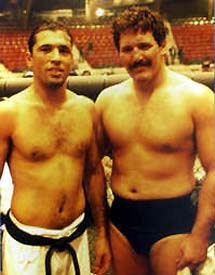UFC 4: Trouble on the horizon
The controversy that came out of UFC 3 over who really was the best fighter – Royce Gracie, who nobody had defeated in competition, Ken Shamrock, who pulled out of the previous tournament final he likely would have won, or Steve Jennum, an alternate who walked into a final and became champion – fueled curiosity that led to what should have been the most successful event the fledgling sport had done.
UFC 4, on December 16, 1994, sold out the Tulsa Expo Center Pavilion with 5,857 fans, set a record with a $140,000 gate, and did 200,000 buys on pay-per-view, a huge increase over previous shows, an unheard-of number for a company that had no regular television outlet.
Shamrock was out of the card since he competed the same week in a two-day tournament in Japan to create the first recognized world champion in the sport, winning the King of Pancrase title.
Gracie and Jennum were back, and the show introduced a new star, Dan "The Beast" Severn. At 36, Severn was the first true world-class wrestler in the UFC. One of the country's best amateur wrestlers of the 1980s, he had gone into pro wrestling, being a star in Japan, but also held a regular job working nights as a caterer.

Royce Gracie and Dan Severn squared off in the finals of UFC 4.
(File photo)
In his debut match, against the smaller Anthony Macias, Severn gave Macias a highlight-reel series of back suplexes, making him an immediate star.
But much of the news from the show was outside the cage. U.S. Senator John McCain made his first push to get the event nixed. Officials in Tulsa spent the last week before the show trying to get it canceled. McCain contacted the district attorney in Oklahoma to find a law to get it shut down, only to come up empty handed.
McCain also attempted to get the key pay-per-view carriers to not broadcast the event, a fight that continued until as late as the day of the show. But because of so many advanced orders, the pay-per-view carriers didn't bow to the pressure.
A second set of problems took place that night. There were only 12 minutes left in the three-hour window when the eight-man tournament championship match with Gracie vs. Severn started. Nobody was all that concerned, because the longest any televised match in UFC history had gone was a little more than five minutes.
Severn took Gracie down and held him there. With two minutes left in the broadcast, panic set in. Not knowing how to deal with the problem, a snap decision was talked about. They could stop the match just as time on the broadcast expired and award a decision, which would have gone to Severn, and also resulted in the jiu-jitsu community revolting. Or they could try and get the pay-per-view extended at the last second. Campbell McLaren made the latter call.
They reached the satellite carriers who agreed to extend the show, but most major cable systems were automatic, and at 11 p.m. Eastern time, the show went off the air in many major markets, with the majority of viewers figuring Severn was about to win.
Four minutes after much of the country went dark, Gracie locked Severn in a triangle from the bottom, a move never seen up to that point in UFC competition, to win what up to that point in time was the most dramatic match in UFC history. But the success in selling the show was tempered by the huge amount of money that cable companies refunded to irate customers.
Ironically, it was both Gracie's most impressive win of his UFC tenure, and the last time Gracie ever got his hand raised in a UFC cage.
NOTEWORTHY
One of the most infamous matches in the "no holds barred" era happened in this show when Joe Son took several hard and direct shots to the groin from Keith Hackney. The punches got Hackney out of trouble and he came back to win the fight. Rules banning low blows were instituted shortly thereafter, but the highlights aired on multiple news shows over the years were used by some to decry the brutality of UFC. Son later became famous in Japan as an MMA fighter and pro wrestler for his gimmick of fighting or wrestling while wearing nothing but a thong. He was arrested on Oct. 7 in Huntington Beach, Calif. and charged with five counts in an alleged gang rape. He remains in jail on $1 million bail.
Veteran Guy Mezger debuted on the show, defeating Jason Fairn in an alternates match. Mezger went on to have a long career in Japan with Pancrase and PRIDE. He is currently an executive with HDNet Fights.
RESULTS
Alternates
Joe Charles def. Kevin Rosier, submission (armbar), 0:14
Marcus Bossett def. Eldo Dias Xavier, KO, 4:55
Guy Mezger def. Jason Fairn, TKO, 2:13
Quarterfinals
Royce Gracie def. Ron Van Clief, submission (rear naked choke), 3:59
Keith Hackney def. Joe Son, submission (strikes), 2:44
Steve Jennum def. Melton Bowen, submission (armbar), 4:47
Dan Severn def. Anthony Macias, submission, rear naked choke), 1:45
Semifinals
Gracie def. Hackney, submission (armbar), 5:32
Severn def. Marcus Bossett, submission (rear naked choke), 0:52
Finals
Gracie def. Severn, submission, triangle choke, 15:49.
